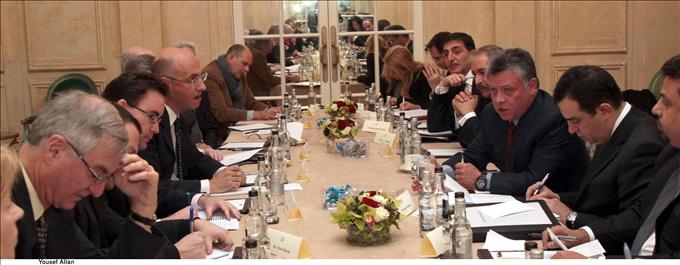Ammon News - LONDON (Petra) His Majesty King Abdullah II met with a number of British political, intellectual and media figures and stressed that Jordan's reform march is moving 'steadily and strongly' forward in the political, economic and social fields.
His Majesty said that the upcoming parliamentary elections, scheduled on January 23, is an essential phase in Jordan's reform drive, that will be followed by other phases to fulfill the Jordanian people's aspirations to a better future.
Concluding a working visit to the UK on Friday, the King briefed the British figures on Jordan's reform map, including the wide-ranging constitutional amendments, the establishment of the Constitutional Court and Independent Elections Commission, new key laws governing political life, and the announcement of early elections, set for January 23.
We will move ahead without hesitation in the reform drive with the highest degree of consensus on all details with the aim of building the modern Jordan, the king said, noting that 'there is no final destination on the reform path'. On the upcoming parliamentary election, His Majesty called on the candidates to present practical programs that address the political, economic and social challenges, noting that the scope of change is proportional to the size of participation in the elections.
His Majesty underlined the importance of forming political blocs comprising national lists and local candidates, expressing hope that such blocs would adopt political orientations representing the right, centre and left, and be built on the basis of platforms that suggest solutions to the challenges Jordan is facing.
The King said that the mechanism of consultation with the Lower House entails consulting over the selection of the prime minister with the blocs that will emerge in the aftermath of the elections. Following that, the premier-designate will consult with the House blocs and the other political forces to form a government that enjoys parliamentary majority. He will seek a confidence vote on the basis of a policy statement, which will also be the outcome of consultations, founded on a four-year program.
The King expressed support of all forms of expression that preserve national accomplishments in all fields. On regional developments, King Abdullah said that despite regional challenges, the Palestinian issue remains the central issue in the Middle East, stressing that finding a just and comprehensive solution to the Palestinian issue would contribute to settling other issues in the Middle East.
All regional and international sides should support the two-state solution, which is the sole way to realize security and stability in the region, the King said, stressing that reaching a comprehensive solution to the Palestinian issue that addresses all final status issues is a priority that should be achieved by the international community.
His Majesty warned that Israeli settlement policies threaten the peace process and the Palestinians rights to an independent and contiguous state.
King Abdullah called on the international community to step up its role in reviving the peace process between the Palestinians and the Israel, especially with the start of the second term of the U.S. President Barack Obama.
The establishment of an independent and viable Palestinian state living side by side with Israel in peace and security is the only way to realize peace in the Middle East, the King said, warning against consequences of wasting the available chance to make peace.
On Syria, the King expressed concern over developments in the neighboring country, noting the increasing number of Syrian refugees who have fled to neighboring countries, including Jordan.
His Majesty outlined Jordan's effort to aid Syrian refugees in the Kingdom, whose number has exceeded 250,000.
The UK figures said that they appreciated His Majesty’s efforts, and his continuous work to achieve peace and stability in the region.
Earlier, the King met with Prince Charles and held talks with British Prime Minister David Cameron and Foreign Minister William Hague on developments in the Middle East, especially the Syrian crisis, means of reviving the peace process and bilateral ties.
His Majesty also met with representatives of the Houses of Commons and Lords at the British parliament in London.
During the meeting, the king stressed the importance of the youths’ role in the reform process, and engaging them in political action and the upcoming parliamentary elections, slated for January 23.
Discussions also covered the Middle East peace process, and prospects of reaching a lasting and just peace based on the two-state solution.
His Majesty also met with Mayor of London Roger Gifford and discussed bilateral ties and ways to develop them in various fields.
King Abdullah highlighted efforts to encourage interfaith dialogue, emphasizing the importance of tolerance and communication to serve humanity all around the world.
